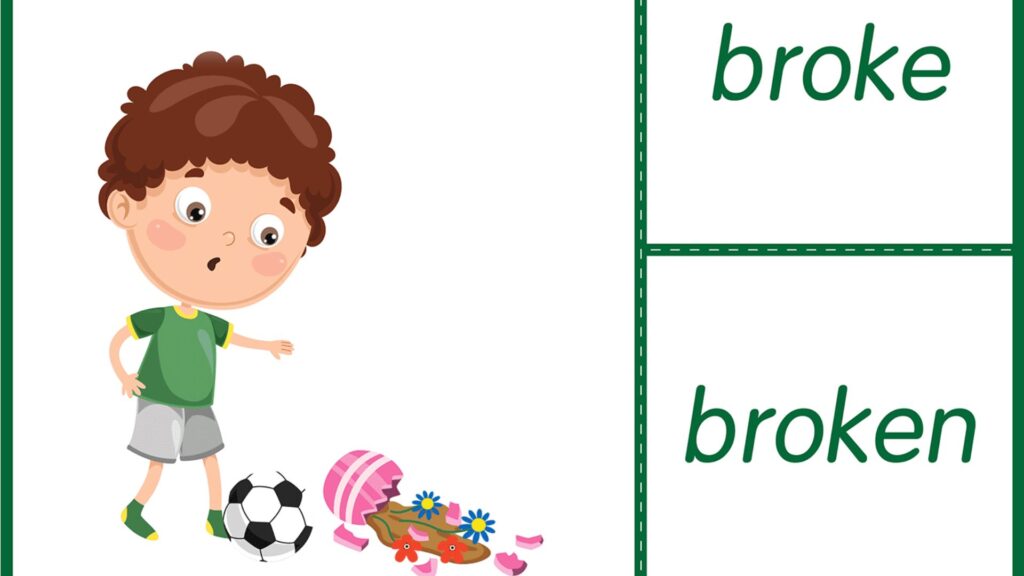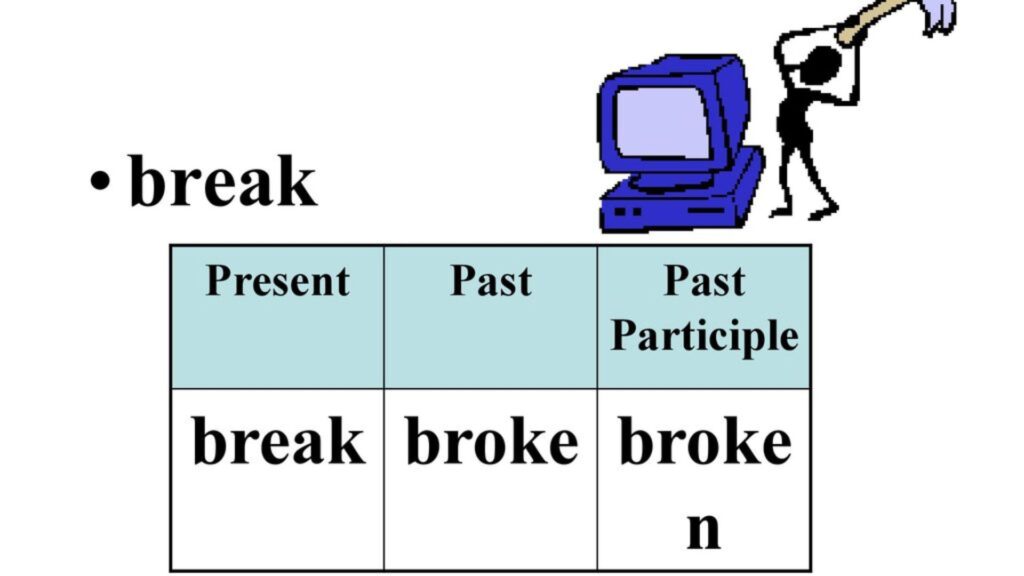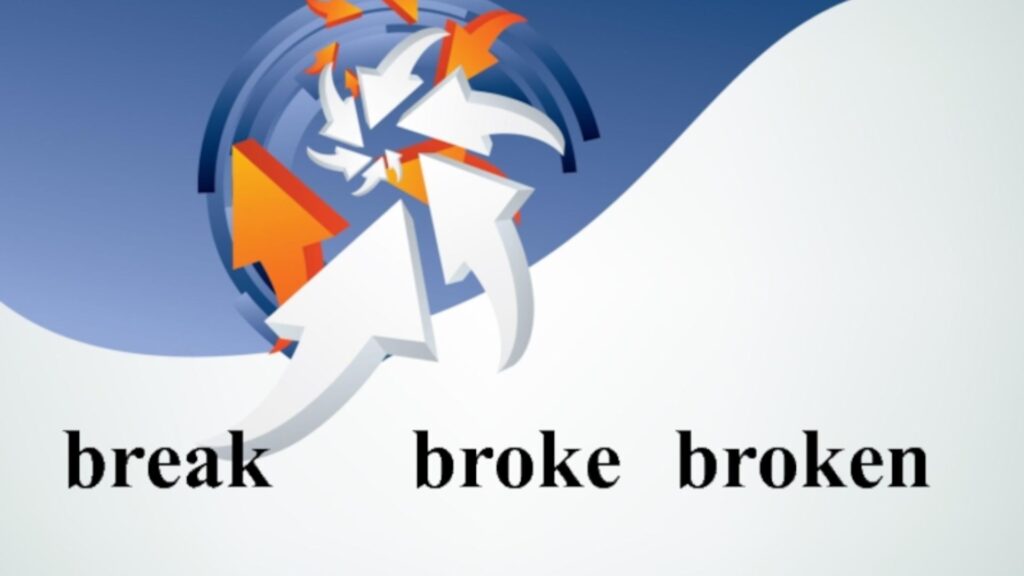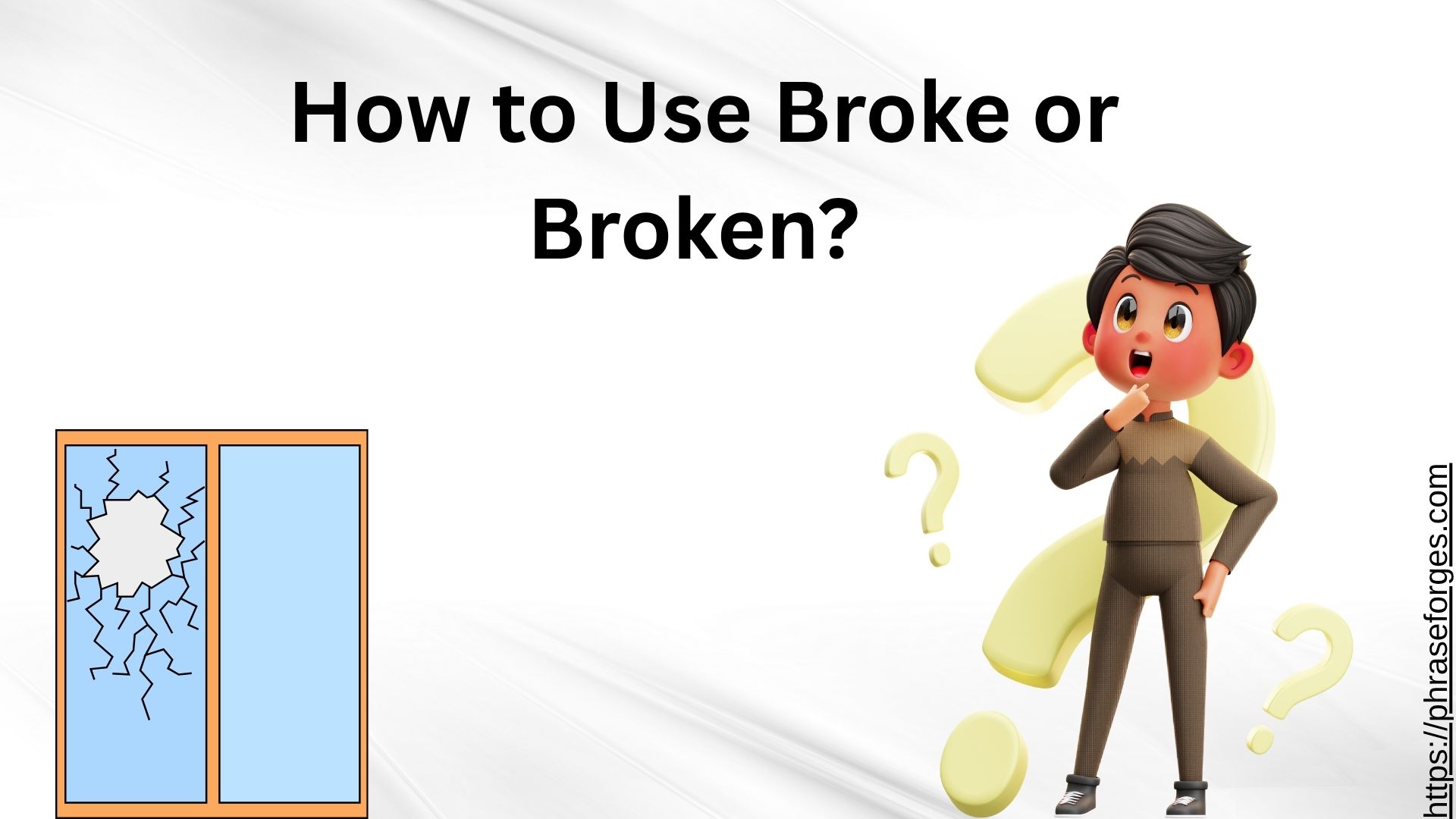If you’ve ever hesitated between saying “I broke it” or “It was broken,” you’re not alone. English verbs especially irregular verbs like break can be tricky. The key to mastering them? Understand the patterns, get familiar with the grammar, and see them in real-life action.
Let’s dive into the difference between broke and broken, how to use each form correctly, and where common mistakes tend to happen.
✅ Keyword + Intro Explanation

“How to use broke or broken?” is a common grammar question for learners of all levels. Both words come from the base verb “break,” but they belong to different verb tenses and grammatical roles.
To use them correctly, you first need to understand how “break” conjugates across tenses.
📚 Simple Definition + Usage Overview
Let’s start with the basics.
- Break = Base form (present): I break the glass every time I do the dishes.
- Broke = Simple past tense: Yesterday, I broke the vase.
- Broken = Past participle: I have broken two cups this week.
Here’s a quick breakdown:
| Verb Form | Example Sentence |
|---|---|
| Base (present) | I break things often. |
| Past (simple) | I broke my phone yesterday. |
| Past participle | I have broken three pairs of glasses. |
🧩 Clear Rules & Patterns
When choosing between broke and broken, the rules are pretty simple once you remember which tense you’re in and whether you need an auxiliary verb.
🔹 Use “broke” when:
- You’re describing a completed action in the past.
- You don’t need helping verbs like have, has, or had.
✅ I accidentally broke the chair.
✅ She broke the window last night.
🔹 Use “broken” when:
- You’re using the present perfect, past perfect, or passive voice.
- You’re pairing it with helping verbs like has, have, or had.
✅ He has broken his leg twice.
✅ The screen was broken during shipping.
📌 Bulleted Rules with Do’s and Don’ts
Here’s a handy cheat sheet:
✅ Do Use “Broke”:
- For past actions with a clear time:
→ “I broke my watch this morning.” - Without auxiliary verbs.
❌ Don’t Use “Broke”:
- With have, has, had
→ Wrong: “I have broke it.”
→ Right: “I have broken it.”
✅ Do Use “Broken”:
- With have, has, had
→ “They have broken the rules before.” - In passive sentences
→ “The window was broken.”
❌ Don’t Use “Broken”:
- On its own to describe a past event without an auxiliary verb.
→ Wrong: “He broken it yesterday.”
→ Right: “He broke it yesterday.”
💬 Multiple Example Sentences
Let’s look at more examples in context:
📧 Email Example – Formal Setting
Subject: Incident Report – Broken Office Printer
Hi James,
Just a heads-up — someone broke the office printer this morning. It seems the paper tray is completely jammed.
I’ve submitted a repair request since the unit is now completely broken and won’t start at all.
Let me know if you’d like me to follow up with IT directly.
Best,
Samantha
🗣️ Casual Text Conversation
Lena: Dude, did you see my headphones?
Alex: Uhhh… yeah. I think I broke them when I sat on the couch.
Lena: Seriously? They’re broken now?!
Alex: I’ll buy you new ones, I swear 😅
🔄 Before/After Examples in Everyday and Formal Contexts
| ❌ Incorrect | ✅ Correct |
|---|---|
| I have broke my charger again. | I have broken my charger again. |
| She broken the vase yesterday. | She broke the vase yesterday. |
| The table was broke in transit. | The table was broken in transit. |
🧠 Common Mistakes & Fixes

Mistakes often stem from confusion around past tense vs past participle.
Here’s how to fix them:
- If you’re using has/have/had, always choose broken, not broke.
- If you’re using the verb on its own in the past, go with broke.
✨ Mini-Test:
Which is correct?
- She has broke her phone again.
- She has broken her phone again. ✅
📘 Quick Reference Table
| Tense | Verb Form | Example |
|---|---|---|
| Simple Present | break | I break my diet every Friday. |
| Simple Past | broke | I broke a glass yesterday. |
| Present Perfect | broken | I have broken two phones this year. |
| Past Perfect | broken | She had broken the vase before moving. |
| Passive Voice | broken | The lock was broken during the storm. |
| Adjective (slang/idiomatic) | broke | He’s totally broke after vacation. |
🧬 Irregular Verb Comparison
“Break” follows the same irregular pattern as these verbs:
| Verb | Past | Past Participle |
|---|---|---|
| wear | wore | worn |
| tear | tore | torn |
| swear | swore | sworn |
| steal | stole | stolen |
| break | broke | broken |
So, if you’ve mastered wore vs worn or stole vs stolen, then broke vs broken will come naturally, too.
🧠 Contextual Notes + Etymology

The verb “break” comes from the Old English brecan, which means to shatter or fracture. Its irregular nature stems from Germanic roots, much like other verbs in its group (e.g., speak/spoke/spoken).
And don’t forget, “broke” is also an adjective in slang:
- “I can’t go out I’m totally broke right now.”
(This has nothing to do with breaking objects just your wallet.)
🧭 Final Thoughts: Use Broke or Broken with Confidence
Whether you’re writing an email, texting a friend, or trying to ace an English test, knowing when to use broke or broken makes a big difference.
Here’s the key takeaway:
👉 Use broke for past actions, and broken when it follows have/has/had or is part of the passive voice.
Whenever in doubt, run through the example sentences above, or try plugging it into your own situation. Language is best learned when you live it, not just memorize it.

